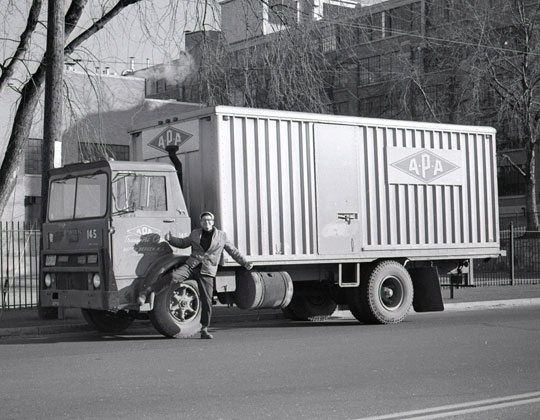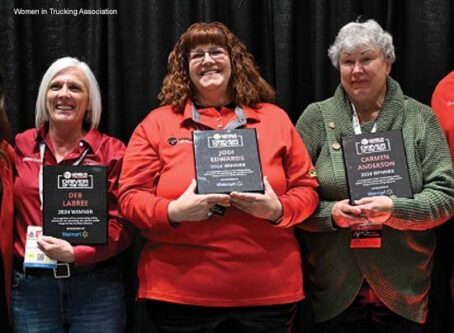Getting rid of Cisco

Cisco was a Vietnam veteran and one ugly guy. His pockmarked face looked like the moon. But that was just my opinion. Women went crazy for him. Eventually, one of them cost him his job as a driver at A-P-A Transport, a long-ago LTL.
Cisco was a nickname. I don’t remember his real name – if I ever actually knew it. He was Italian, not Latino, and he was just “Cisco” to everyone. I met him for the first time when he flagged me down at the New Rochelle, N.Y., entrance to I-95 southbound. It was in the fall of 1969.
We both drove MB Mack straight trucks doing local P&D (pickup and delivery) out of the main terminal in North Jersey. Cisco worked Westchester County; I did the Stamford area of Connecticut. Dispatchers often gave me pickups in Westchester, the Bronx, and Manhattan on my way home. That day, they sent me to back up Cisco in New Rochelle. He was new among the hundreds of drivers who worked from North Bergen, N.J.
Cisco was pulled over a short way from the toll booths when he saw me coming in his mirror. He hopped out and waved me to pull over. When I did, he came to my window and introduced himself. Then he started talking. This wasn’t going to be quick. I got out and stood with him as he blurted out his big problem. It had nothing to do with A-P-A or business.
Cisco was set to be married that Saturday, just a few days away. But he had changed his mind and didn’t want to do it. It was going to be a huge, Italian wedding. “A Sicilian wedding,” he added.
Cisco didn’t know what to do. I told him he should tell his fiancé he had changed his mind. I remember his exact words to this day.
“I can’t,” he said.
I asked why not?
“Her father will kill me.”
No, he won’t, I said in what I hoped was an amused but assuring tone.
“Yes, he will,” Cisco said. “He’s in the business.”
I’m kind of slow, so it took me a few seconds to realize what business he was talking about.
The wedding happened, and Cisco was off on a honeymoon the following week. When he came back, he talked about his troubles with women – not just his wife. And sometimes he behaved oddly. The oddest was the time he crossed the double yellow line behind me on N.J. Route 5, a two-lane road that ran up a long hill. I thought the crazy guy was trying to pass me. Then, I saw him in my mirror through his windshield. He was flagging me down again, this time while overtaking me in the oncoming lane. There was no other traffic at that point, so I slowed, put on my flashers, and stopped. So did Cisco as he pulled alongside. Our two A-P-A trucks were blocking Route 5 in both directions. This had to be a serious emergency.
Cisco motioned me to reach over and adjust his shotgun-side mirror. Was he kidding? No, he wasn’t. I reached out my window and followed his directions. By the time he was happy with the mirror, cars were stopped behind and in front of us. It took some maneuvering for Cisco to get back into the proper lane.
A-P-A used part-timers to check-in drivers who arrived mostly between 4 and 7 p.m. One day, not long after the Route 5 adventure, they hired a new checker, a young blond-haired woman.
Word was she was a full-time student at Rutgers in Newark.
She was stunning. Drivers fiddled and stalled in front of the checkout slots hoping to have her check them out. One Monday a month into her new job, she called in sick. So did Cisco. She called in sick that Tuesday and Wednesday. So did Cisco. They both reappeared Thursday. The rumor mill said they had spent three days at a motel on Tonnelle Avenue.
Not long after that, the stunning blonde quit, and Cisco started chatting with a pretty, young office worker in her car every day before starting time. By early December, you couldn’t tell if they were chatting or what. The car windows were totally steamed. The young office worker showed up at A-P-A’s traditional, elaborate Christmas party with Cisco that year. So did his wife. The three sat at the back of the giant hall where the two women argued at various levels of volume until an A-P-A vice president asked them all to leave.
A-P-A management frowned on that kind of behavior. And that wasn’t all they didn’t like about Cisco. Not long after gaining seniority and Teamster membership, Cisco pretty much stopped working after 3 p.m. The Portchester driver and I were making most of his pickups. There was no doubt, Cisco’s days at A-P-A were numbered. But management didn’t realize how high that number would be.
They fired Cisco twice, and twice with help from the union he was reinstated. At that point, A-P-A hired a security firm to document his violations of company rules and the Teamster contract. They were determined to fire him so that he stayed fired. I didn’t see him much after he began meeting with the office gal in the mornings.
Most of what I know after that was rumor. I can’t verify any of it, but I do believe it all.
The security company put a spotter on Cisco to follow him during at least part of his workdays. It was supposed to be surreptitious, but Cisco knew right away he was being followed by the plain-looking, black Ford that looked more like a cop car than most cop cars. One day, he saw an opportunity he could not pass up. I don’t know what it’s like now, but in 1970, the intersection of North Street and Main in New Rochelle was a busy place. Main Street at that point was U.S. Route 1, northbound. There was a traffic light, but there would often be a cop as well.
One day Cisco entered the intersection with the black Ford right behind him. He stopped, leaned out the window, and told the cop he had a shipment of guns on board and he was being followed by the black Ford behind him. The cop waved Cisco on but stopped the Ford and called for backup on his Motorola two-way. It was a stroke of slacker genius that made Cisco something of a drivers’ room legend.
After that, stories of Cisco’s exploits were less than clear. They didn’t always make sense. For example, they say he began picking up a girlfriend to spend the day with him on the truck.
Passengers of any kind were a big no-no.
How could he do that with a spotter on him? The big, almost flat windshield on an MB Mack made it almost impossible for an adult to hide in the cab. Maybe A-P-A had given up on the security company. But there is no doubt that from time to time Cisco had a woman in the truck with him. A new girlfriend? An old one? Did he pick her up near home in New Jersey or was she from here in Westchester County? No one seemed to know. But for certain there was a woman in Cisco’s cab on his last day at A-P-A.
One of Cisco’s deliveries that morning was to a New Rochelle marina on the Long Island Sound, a fairly regular stop. He had a couple of Mercury outboard motors for them. There was no dock, and the engines were heavy. Cisco hand-trucked them to the tail gate, then hopped out to get the forklift driver. The MB’s Scania diesel was idling when the young lady scrambled across the console that separates the two seats in an MB cab. That isn’t easy. She must have been petite. Anyway, she dropped into the driver’s seat and just as she had probably seen Cisco do many times, pushed down on the parking brake handle, disengaging it. She was going to tease Cisco by driving the truck around the big yard. At least that’s the theory. Or maybe she was really pissed at Cisco. I don’t know. Maybe it’s in the police report.
In any case, what she actually did was steer Cisco’s A-P-A MB Mack straight down the marina’s boat launch into Long Island Sound.
I never saw Cisco after that. The police report had to give A-P-A all it needed to fire him for keeps.
Ten years later in 1980, deregulation opened a trap door under the traditional LTL business. By 1990, most of the LTLs with Teamster contracts had fallen in and disappeared. It would be another 13 years, until 2003, for A-P-A to finally succumb – one of the last of its kind to die.









